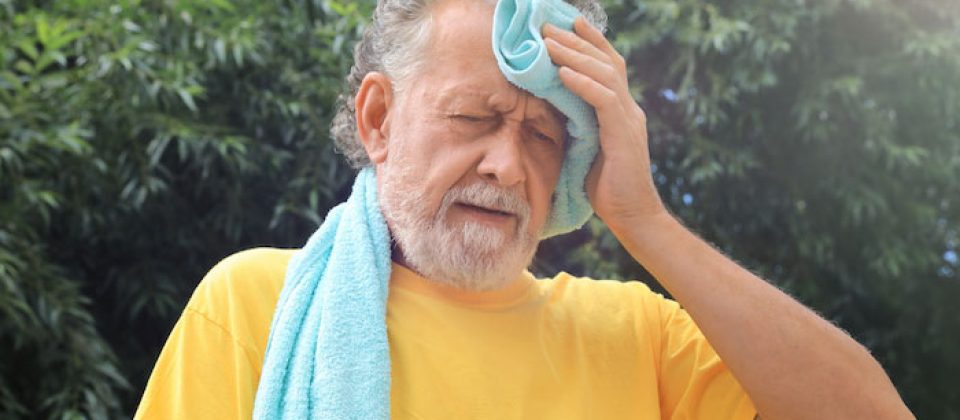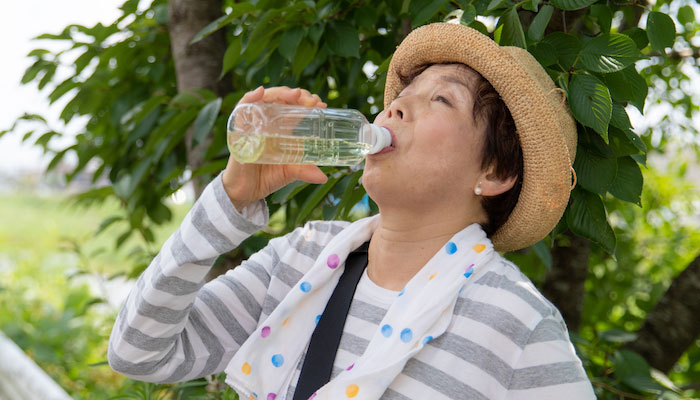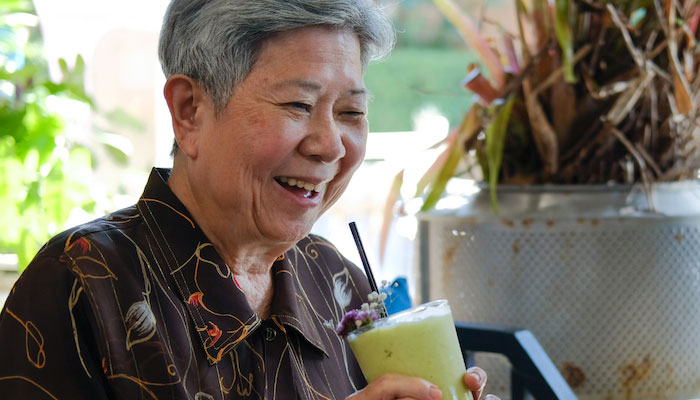
Staying Safe in Extreme Temperatures-Dehydration
People in the U.S. are noticing hotter summers which impact all of our lives. Most especially, seniors are in danger of dehydration leading to heat exhaustion and heat stroke.
Dehydration occurs when you use or lose more fluid than you take in, and your body doesn’t have enough water and other fluids to carry out its normal functions. If you don’t replace lost fluids, you will get dehydrated.
This can happen either when a person doesn’t drink enough, or when he or she loses large amounts of fluid through diarrhea, vomiting, sweating, or exercise. A severely dehydrated body no longer has enough fluid to get blood to vital organs. This can cause shock, a life-threatening condition. Because elderly people don’t feel thirst as much, make a special effort to provide the person in your care with enough fluids. A person’s fluid balance can be affected by medication, emotional stress, exercise, nourishment, general health, and weather. Dehydration, especially in the elderly, can increase confusion and muscle weakness and cause nausea. Nausea, in turn, will prevent him or her from eating or drinking, causing more dehydration.
Older adults can also become dehydrated because they may:
- Have kidneys that do not work well.
- Choose not to drink because of incontinence.
- Have physical problems that make it hard to drink or hold a glass, find it painful or exhausting to walk to the bathroom, or difficult to communicate.
- Take medicines that increase urine output.
- Have minor illnesses such as influenza, bronchitis or bladder infections. Make sure the person in your care drinks extra fluids when they are not feeling well.
Stay hydrated, Stay Safe
Drinking plenty of water is key to staying healthy in the heat. During hot weather, drink more liquid than your thirst indicates. Increase fluid intake, regardless of activity level. Avoid drinks containing alcohol, caffeine and sugar because they actually cause you to lose more fluid. If a doctor limits fluid intake, ask how much fluid to offer.
- Keep drinks cool, not cold, which causes stomach cramps.
- Wear loose clothing which helps air to circulate around your skin, allowing sweat to evaporate and cool your body.
- Stay out of the sun.
- Wear a hat, sunglasses and sunscreen. Sunburned skin hampers your body’s ability to cool off.
Source: Centers for Disease Control and Prevention; WebMD; MayoClinic.com; MedicineNet.

Understanding Danger Signs
Older adults naturally have a lower volume of water in their bodies, and may have conditions or take medications that increase the risk of dehydration.
Severe, acute diarrhea — that is, diarrhea that comes on suddenly and violently — can cause a tremendous loss of water and electrolytes in a short amount of time. If a person is vomiting along with diarrhea, the person loses even more fluids and minerals.
You can usually reverse mild to moderate dehydration by drinking more fluids, but severe dehydration needs immediate medical treatment.
Symptoms
Thirst isn’t always a reliable early indicator of the body’s need for water. Many people, particularly older adults, don’t feel thirsty until they’re already dehydrated. That’s why it’s important to increase water intake during hot weather or when ill.
The signs and symptoms of dehydration in an adult are—
- Extreme thirst
- Less frequent urination
- Dark-colored urine
- Fatigue
- Dizziness
- Confusion
- Headache
- Dry mouth, lips and eyes
When to see a doctor
- Call your family doctor if the person in your care:
- Has had diarrhea for 24 hours or more
- Can’t keep down fluids
- Has bloody or black stool
- Is irritable or disoriented and much sleepier or less active than usual
Heat Exhaustion
Heat exhaustion occurs when the body becomes severely dehydrated. If left untreated, it leads to heat stroke. If you suspect a person is having a problem with the heat, err on the side of caution and insist they get into shade and cool down.
Signs of Heat Exhaustion
- Heavy sweating, cold, clammy skin
- Dizziness or fainting
- A weak and rapid pulse
- Muscle cramps
- Fast, shallow breathing
- Nausea, vomiting or both
Source: Department of Health and Human Services; Caregiving in the Comfort of Home
Taking Care of Yourself- Give Yourself Permission to Take an Intermission
Find a Mental Health Mentor Seek out one professional (mental health professional or minister) or more experienced caregiver to talk to. Discuss the impact of your caregiving experience, and he or she can advise you, comfort you and be your advocate to access services. Maintain regular contact with this person.
Find a Support Group Attend a caregiver support group meeting. You will discover that others are living the same experience, and you will gain invaluable suggestions and ideas.
Take Time to Laugh Allow yourself to find the humor in caregiving, and maintain regular contact with friends who are upbeat. Laugh heartily.
Don’t Fall – Dehydration/Falls
Dehydration can be a very common cause of falls in older adults. It can often cause dizziness and a drop in blood pressure, which can increase the risk of falling. If the person in your care experiences incontinence, find ways to build their confidence around having a drink. This could be by encouraging them to drink small amounts often throughout the day, so that they are less likely to urgently need the toilet after a big drink.

Safety Tips- Dehydration and Dementia
If the person in your care is thirsty or needs water, but has dementia, they may not know how to express that. When this happens, we have to be aware of the signs of thirst. Simply putting out a glass of water may be enough. But if the glass is soon empty, it doesn’t mean the person drank it—the water may have been spilled or poured out. Make sure the cup or glass is comfortable— not too heavy or an awkward shape. To help ensure the person in your care is hydrated, offer a glass of water, but stay with the person to make sure they are drinking it.
Plain water can get boring, so try offering other liquids the person enjoys, such as juice, decaffeinated tea, hot and cold milky drinks, smoothies, yoghurt and warm or cold soups. High water fruits and vegetables such as watermelon, tomatoes, cucumbers, zucchini etc. also add fluids to the diet. Ice cream and sorbets are cooling and hydrating.